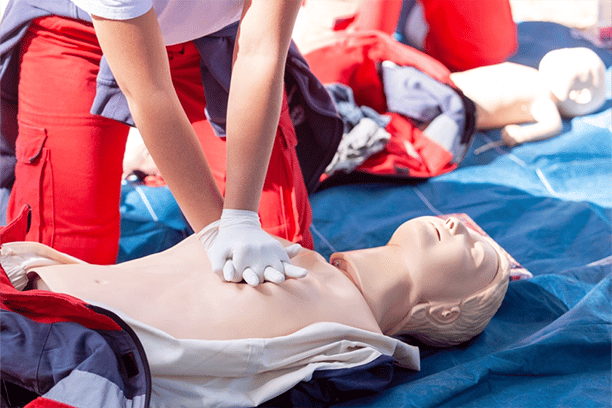What is BLS?
Basic Life Support (BLS) refers to the fundamental medical care provided to individuals experiencing life- threatening emergencies. It involves cardiopulmonary resuscitation (CPR) techniques to support someone whose heart has stopped or is not beating effectively. BLS training includes chest compressions, rescue breathing, and the proper use of an AED.
Why is BLS Training Crucial for out-of-hospital Healthcare Providers?
Medical emergencies can happen anywhere. Having employees or staff trained in BLS can mean the difference between life and death. When ACLS medical professionals may not be immediately available, trained individuals can step in to provide crucial lifesaving assistance before professional help arrives.
Benefits of BLS training for out-of-hospital providers:
Prompt action is vital during emergencies. Trained individuals can quickly assess the situation, initiate CPR if needed, and activate emergency medical services.
Studies show that immediate CPR, before the arrival of emergency medical personnel, can significantly improve the chances of survival for cardiac arrest victims. Some studies support up to an 80% increase in survival odds for patients who receive pre-hospital care.
Ensuring employees are trained in BLS promotes a safe and prepared work environment, leading to enhanced employee confidence and overall well-being. It is important that students receive hands-on training every two years for certification needs (American Heart Association, American Red Cross, American Safety and Health Institute) and yearly, or even quarterly as a refresher and skills confidence builder.
What is an AED?
An Automated External Defibrillator (AED) is a portable device designed to deliver an electric shock to the heart during sudden cardiac arrest (SCA). AEDs are simple to use and provide step by step instructions. With proper training, anyone can confidently operate them. Public AED’s are even made to be used by individuals who have little to no experience in using the device.
The Importance of AED Training:
AEDs are designed to provide audio and visual instructions, making them accessible to anyone, even without prior medical training.
AEDs are crucial for restoring a normal heart rhythm, and early defibrillation significantly increases the chances of survival.
AEDs are equipped with safety features that analyze the heart rhythm and only deliver a shock when necessary, minimizing the risk of user error.
Importance of Creating an Emergency Response Plan:
In healthcare facilities, it’s necessary to have a well-designed emergency response plan that includes BLS and AED training. Here are some key steps to develop an effective plan:
Designate individuals who will be trained in BLS and AED usage. They will be the first responders during emergencies, so if you have individuals with previous BLS experience it may be a good idea to assign them to a “code leader” role.
Ensure that designated personnel undergo certified BLS and AED training courses and maintain their certification through regular updates. Most organizations require hands-on renewal classes every two years to ensure that employees are up to date on the latest information.
Strategically place AEDs in easily accessible, well-marked locations, and always ensure they are regularly maintained and checked for functionality. Regular inspections of AED’s should be scheduled on a weekly, monthly, and yearly interval to ensure the device and its accessories are still in date and will operate in an emergency situation.
Conduct regular safety drills and raise awareness among all staff members about the emergency response plan and the location of AEDs. Regular “code drills” should be implemented to ready your staff for these emergencies. Remember, practice makes perfect!
IGH provides CPR, AED, First Aid, BLS, and ACLS Training for all organizations along with AED Sales, Maintenance, and Inspections to ensure your staff is prepared for a Cardiac Arrest event.
We also provide assistance with creating Emergency Action Plans and/or forming emergency response teams. If you, or your organization, are in need of these services please feel free to reach out for more information.
Our Main Office number is (817) 809-8677 or you can reach us via email at info@ighsafety.com
Thank you,
Janet Edwards BSN, RN
Director of Administration & Education
IGH Health, Fire, & Safety
admin@ighsafety.com


